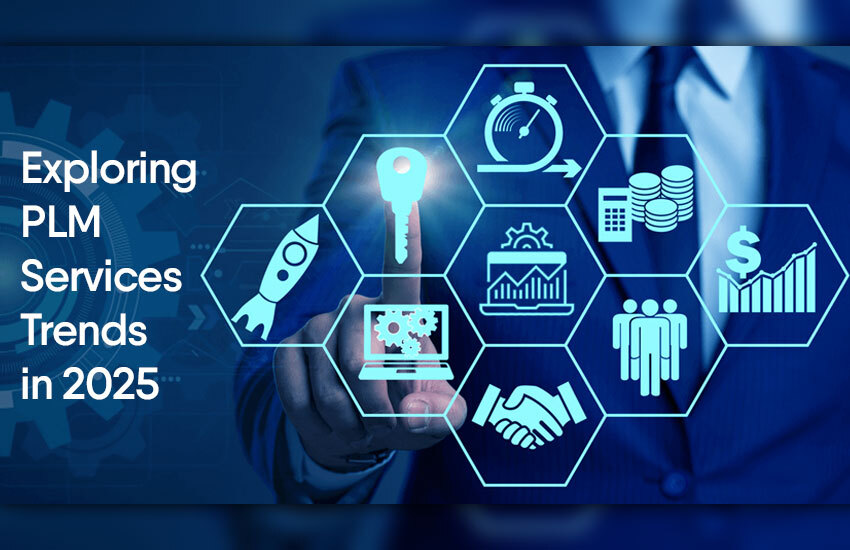
In an era characterized by digital transformation and innovation fueled by artificial intelligence, PLM services in India are developing quickly. For industries that depend on PLM for engineering, design, and manufacturing, 2025 is a critical turning point as businesses seek to improve product quality throughout the lifespan, cut costs, and streamline operations. Let's examine the major developments, integration tactics, and the influence of AI on next-generation solutions in the developing PLM software trends of 2025.
For more understanding on PLM services in India and PLM services in USA, you can check out our blog post, “What Are PLM Services and Why Are They Essential for Businesses?”!
PLM services are much more than just product data management. These days, they cover everything from cloud-based PLM and real-time communication tools to PLM integration services and implementation methodologies. Businesses are using product lifecycle management solutions that provide agility, scalability, and data-driven insights in response to growing global competition and consumer demand for customized products.
Businesses are spending more in 2025 on PLM software development that integrates easily with other enterprise systems, such as MES, CRM, and ERP. Businesses are gaining a more cohesive perspective of their operations because of this connection, which also makes it possible to analyze consumer data, improve forecasts, and improve customer satisfaction.
Let's examine the most notable PLM software trends for 2025 in more detail:
The way that goods are designed, created, and maintained is being redefined by the incorporation of AI in business. Predictive analytics, generative AI, and data automation are examples of AI-driven PLM systems that are assisting businesses in detecting design faults early on, optimizing material utilization, and more accurately forecasting demand.
Today, a key component of PLM services is predictive analytics, which enables manufacturers to foresee equipment breakdowns and minimize downtime.
Design processes are being revolutionized by generative AI, which produces optimum prototypes based on performance restrictions and goals.
By guaranteeing timely and high-quality product delivery, these developments not only increase engineering efficiency but also improve the customer experience.
In 2025, cloud-based PLM platforms are becoming more popular. They provide remote access, scalability, and real-time collaboration - all essential for the mixed work settings of today. Businesses can lower IT expenses while enhancing system performance and data security by implementing cloud computing.
Additionally, SaaS-based PLM systems designed for SMEs and large companies are being offered by PLM vendors in India and around the world, democratizing access to top-notch product lifecycle management solutions.
Projects are now strongly linked to 4.0 PLM for production. PLM systems in engineering are being used in smart factories to link machines, track performance, and immediately implement product improvements. PLM systems get real-time data from production lines, which improves design and development.
Improved customer retention and behavioral targeting are the results of manufacturers anticipating client needs and aligning production accordingly with the aid of AI-powered sales forecasting tools coupled with PLM platforms.
By 2025, there will still be a growing need for strong PLM integration services. Businesses want PLM, ERP, CRM, and other business tools to work together seamlessly. Holistic data analysis, efficient processes, and successful customer relationship management (CRM) AI integration are made possible by this link.
Aligning technology with company objectives, guaranteeing user uptake, and reducing interruptions are all components of successful PLM deployment techniques. Leading PLM suppliers in India, such as Modelcam Technologies, provide comprehensive services from planning to implementation, guaranteeing a seamless digital transformation process.
Businesses who spend money on contemporary PLM services are gaining a number of competitive advantages:
Faster Time-to-Market: AI and automation speed up and improve the accuracy of design iterations.
Better Decision-Making: Strategic planning and corporate intelligence are improved by having access to real-time data.
Efficiency in Design and Engineering: streamlined processes minimize errors and manual labor.
Enhanced Collaboration: Even in distant installations, cloud-based PLM encourages cross-functional interaction.
Improved Customer Insights: Personalized experiences and more thorough customer data analysis are made possible by integrated systems.
Businesses are better able to innovate, adapt to changes in the market, and provide consumers with outstanding value when they embrace the future of PLM software.
To find out more about how PLM services are beneficial for manufacturing and engineering firms, you can explore our blog post, “Top Benefits of PLM Services for Manufacturing & Engineering”!
The following important factors will impact the growth in PLM adoption in 2025:
Needs for Customization and Globalization: Businesses require scalable PLM systems as they grow internationally in order to handle a variety of product lines and client demands.
Digital Transformation with PLM: To keep ahead of the curve, businesses are adopting digital transformation with PLM. PLM is becoming a major center of innovation through integration with AI-powered tools, voice search optimization, and real-time analytics.
Regulatory Compliance and Traceability: To ensure complete product traceability and regulatory compliance, sectors such as healthcare, automotive, and aerospace depend on PLM technologies.
Sustainability Objectives: In line with international sustainability requirements, contemporary PLM systems encourage environmentally sustainable design and material reuse.
Selecting the appropriate partner is crucial given the rising demand for PLM. With their specialized PLM services and proficiency in PLM software development, integration, and deployment, businesses such as Modelcam Technologies are setting the standard.
Modelcam's strategy is centered on coordinating technology with business plans, providing services in:
Complete integration of PLM
Data analysis powered by AI
Personalized CAD and PLM solutions
implementation tailored to a certain industry
Using cutting-edge digital technologies, their customized solutions assist engineering and industrial teams in increasing productivity and fostering creativity.

The future of PLM software will be determined by its capacity to incorporate cutting-edge technologies like blockchain, AI, and the Internet of Things as we approach 2025 and beyond. PLM will advance in intelligence, autonomy, and prediction, allowing companies to:
Proactively meet consumer wants
Optimize the entire lifecycle of the product.
Boost customer happiness and product quality
Data automation, AI-driven solutions, and PLM technology will all come together to produce smarter, more integrated systems that support corporate expansion and change.
The PLM services industry is rapidly changing, and 2025 will be a turning point in how companies handle product data, enhance processes, and provide better customer experiences. Businesses who adopt these trends, from cloud-based PLM to AI-driven analytics, will not only maintain their competitiveness but also lead the upcoming innovation.
Are you prepared to investigate PLM's future? Change your product lifecycle strategy right now by collaborating with professionals like Modelcam Technologies.
Let’s connect: www.modelcamtechnologies.com
Email: sales@modelcamtechnologies.com
Mobile no : +91 8237016167
©Copyright 2025. All rights reserved by Modelcam Technologies Private Limited PUNE.